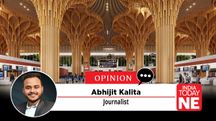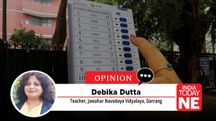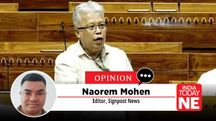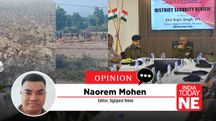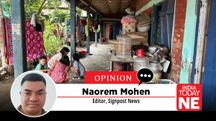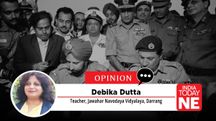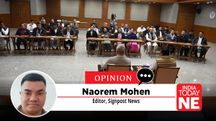
Reviving the heartbeat of Bodo culture: The essential role of festivals in Sifungs’ survival
Since dawn, 29-year-old Nandalal Basumatary, coordinator of the Sifung Project has been hard at work in the small village of Thaijouguri, nestled in the Rowmari region of Assam’s Chirang district, 200 kilometres from Guwahati.
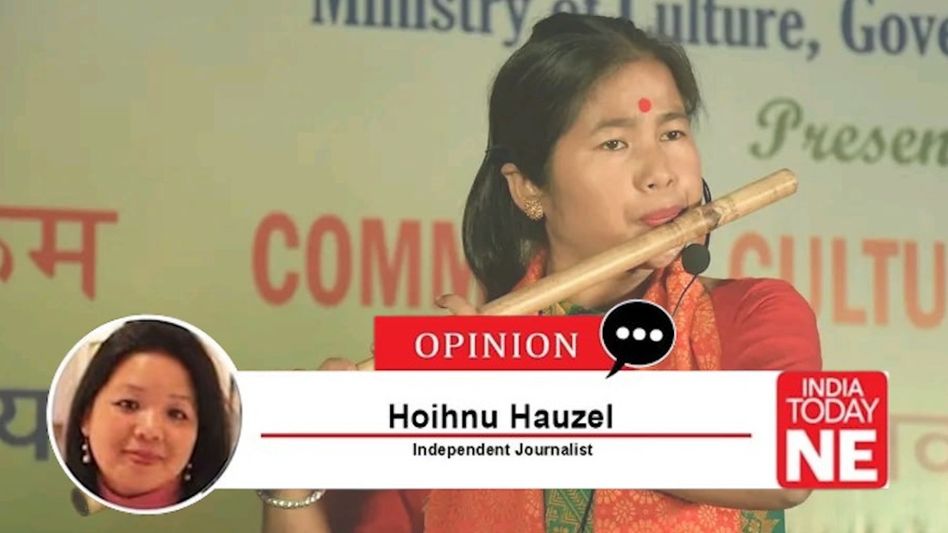
Since dawn, 29-year-old Nandalal Basumatary, coordinator of the Sifung Project has been hard at work in the small village of Thaijouguri, nestled in the Rowmari region of Assam’s Chirang district, 200 kilometres from Guwahati.
He’s busy constructing a stage for tomorrow’s Sifung Festival—an event he believes has the potential to ignite a cultural renaissance for his people.
With only 25-30 households, Thaijouguri is a modest village, but tomorrow, it will come alive in a way it never has before. The two-day festival promises to not only unite the village but also reignite a deep, ancestral connection to the rich traditions of the Bodo people.

The task of preparing for the event is immense. Nandalal and his team are building a platform capable of hosting 500 people, but the festival’s significance goes beyond the logistics of staging it. For Nandanlal, this celebration is about more than just a gathering; it’s an effort to preserve and restore the Bodo way of life, which has slowly eroded under the pressures of modern influences.
Nandalal’s connection to this mission runs deep. He recalls his college years in Bongaigaon when the Sifung, a traditional bamboo flute, was rarely seen outside of major festivals. “It was a special occasion instrument,” he says growing up in Hatipota, a sleepy village in the Chirang district where “no one played instruments except during big celebrations.”
Once a thriving part of every Bodo home, the Sifung flute had been relegated to the sidelines, replaced by modern entertainment forms. In a time when digital media has captured the attention of younger generations, traditional music and dance have become increasingly scarce.
Also Read: Timilo Boutique in Tawang: An inspiration of Sustainable Tourism
The Sifung Festival will take place at the Sifung campus, established just a year ago by the Action Northeast Trust (ANT) with support from Royal Enfield. “The venue must be large enough to accommodate at least 500 people,” Nandanlal says, his hands busy fixing pillars and setting the stage. But the true heart of the festival lies in its purpose: to revive unity, tradition, and a shared sense of cultural identity that the Bodo people have started to lose over time.
This sentiment is shared by many in the Bodo community, where traditional instruments like the Kham (a long drum), Serja (a four-stringed violin), and Jotha (cymbals) once played an integral role in every significant life event. Dances like Bagurumba and Bardwi Sikhla were forms of expression, a channel for joy and cultural pride. However, these practices have seen a decline, as fewer young people are learning the traditional arts, and fewer teachers are around to pass them down.
Jeniffer Liang, co-founded the ant, an NGO working for rural development in 2000 and since lived and worked in Chirang District of Bodoland, reflects on the slow but steady progress. “We’ve just begun to breathe life into the Sifung tradition,” she says. “Thanks to support from patrons like the Royal Enfield, we’ve trained new musicians and dancers. But we have a long road ahead.” She believes that for the initiative to succeed in the long run, it must be strengthened through continued mentorship, a strong resource base, and institutional support. “When we started, there were no Sifung musicians,” Jenny adds. “We trained youth, and now they’re part of the cultural troupe that’s spreading Bodo heritage.”

The revival is powered by an unyielding passion to restore what was nearly lost. Liang observes, “The group’s perseverance, despite the lack of resources, is nothing short of inspiring. They’ve been carrying the flame of tradition for years, often with very little support.” This determination is what drives Nandalal and his fellow musicians to keep pushing forward, despite the challenges.
The Sifung Harimu Afad (Sifung Cultural Group), founded in 2014, has played a crucial role in this revival.
More than 250 young musicians and dancers have been trained since its inception, not just to perform but to embrace Bodo culture. The group’s inclusive approach — encouraging both boys and girls to learn instruments and perform together — has garnered a sense of shared cultural pride. Bijli Brahma, 29, a teacher at the Upper Primary School in Goalpara, has been part of the Sifung group for over 11 years.
Although she resides in Goalpara, about 100 kilometers away from her hometown in Chirang District, she never misses an opportunity to return home during holidays and practice with the troupe. “I’ve loved the Sifung since childhood,” she says.
“As a child, I was always eager to be a part of it. I was involved in the student union and the cultural team, and I learned a lot as a student in Rowmari.” She recalls being captivated by the melodies of the Sifung flute, and it was there that she learned how to dance and play. “It was my dream to be part of this tradition.”
Initially, her parents had doubts about whether their daughter could pursue her passion, but those concerns quickly faded. They wholeheartedly supported her journey, and in time, she was able to turn her dream into a reality.
It is individuals like Brahma and other women in the group who are helping to break down long-standing gender barriers, while uniting generations in the effort to preserve the Bodo way of life. Their dedication has led the troupe to perform across India, raising awareness of the cultural richness of the Bodo community.
Despite these successes, the group faces ongoing challenges. Many of its members, now in their late 20s, struggle to secure stable livelihoods. Some have moved to cities for work, while others contribute to NGOs. Without sustained support, the momentum of the cultural revival could slow.
One of the keys to keeping this revival alive is the infrastructure that supports it. Before receiving backing from Royal Enfield, young performers often practiced in open fields or makeshift spaces. Now, with the establishment of the Sifung campus, they have a dedicated space to refine their craft. This campus has become a central hub for training, workshops, and performances, providing the foundation necessary for the next generation of Bodo musicians and dancers to thrive.
The initiative has grown significantly, with six branches now spanning nearly 100 villages, including five in Chirang and one in Kokrajhar. More than 600 young people, aged 7 to 25, are actively involved in learning traditional music and dance. This expansion is a clear sign that the traditions of the Sifung and other Bodo instruments are being safeguarded for future generations.
“The Bodos are one of the oldest indigenous communities and the original “Bhumiputra” (sons of the soil) of Assam. They have a rich cultural heritage, spanning art, cuisine, and handicrafts, yet much of the world remains unaware of these aspects of Bodo life. Their folk music and dances are deeply intertwined with their identity. While the Bodo people are well-versed in these traditions within Assam, they still haven’t gained the recognition that events like Bihu enjoy outside the region,” says Utpal Borpujari, award-winning filmmaker. As a filmmaker, I would love to explore and bring these rich traditions to the forefront in my future projects.”
For Prabir Brahma, a 30-year-old teacher from Nongpra Shantipur, the revival is deeply personal. Growing up surrounded by music, he didn’t have the opportunity to pursue it seriously until later in life. After completing his BSc, he joined a workshop in his village, where he learned about Bodo instruments like the Kham and Sifung. Today, as a Science teacher at JRBM Higher Secondary School, Prabir encourages his students to embrace their cultural heritage through music. “Culture and music are at the heart of our identity,” he says. “If we don’t actively preserve these traditions, they’ll be lost.”
Nandalal and Prabir’s stories highlight the critical role of community engagement in sustaining cultural revival. One powerful way to ensure this is through festivals, like the Sifung Festival. These events are not just celebrations; they’re opportunities for young people to connect with their heritage, gain inspiration, and carry the torch forward.
Dhananjay Basumatary, an Executive Member of Bodoland, agrees.
“Festivals like this are essential to keeping Bodo traditions alive,” he says. “They raise awareness and attract support, ensuring that young artists have the resources they need to flourish.”
As Nandalal puts the final touches on the stage, he hopes that tomorrow’s festival will mark the beginning of a new era for Bodo culture. With the passion of individuals like Nandalal and Prabir, and the unwavering commitment of the Sifung Harimu Afad, the rich traditions of the Bodo people will continue to resonate in every home, celebration, and generation to come.
Copyright©2025 Living Media India Limited. For reprint rights: Syndications Today


